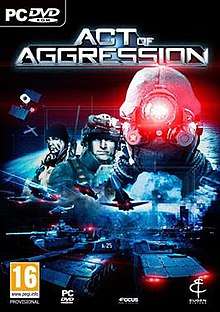Act of Aggression
Act of Aggression is a 2015 real-time strategy game developed by Eugen Systems and published by Focus Home Interactive.
| Act of Aggression | |
|---|---|
 | |
| Developer(s) | Eugen Systems |
| Publisher(s) | Focus Home Interactive |
| Engine | IRISZOOM V5 |
| Platform(s) | Microsoft Windows |
| Release | September 2, 2015 |
| Genre(s) | Real-time strategy |
| Mode(s) | Single-player, multiplayer |
Synopsis
In the year 2019, the "Shanghai Crash" triggered the eventual collapse of the entire Chinese financial system. It plunged the whole world into an economic recession, the largest since the Great Depression. Third world countries suffered the worst from the crisis and were on the brink of collapse. "The Cartel", a private military corporation, seizing the opportunity to become a dominant superpower as a military-industrial global syndicate, covertly infiltrates most of the weakened countries and establishes them as the Cartel's puppet regimes.
It was rumored that the Shanghai Crash was not the result of a business rundown, but was orchestrated by an unknown group of individuals. Initial investigations into this theory ceased, due to lack of evidence, and the theory is now dismissed as a conspiracy theory. The United Nations, determined to investigate and uncover the truth behind the Shanghai Crash, has signed the "Chimera Protocol" in secrecy. This protocol binds several UN Members states together to provide military intelligence and support for further investigation. With several black ops operations executed the UN slowly uncovers evidence. The United States, suffering from the economic crisis and recurring defense budget cuts, struggles to maintain its influence as a global superpower. Around 2025, as relations with a newly formed Mexican nation, close to the American borders, deteriorate, American Forces intervene, resulting in a conflict that may drag in the two other factions.
Factions
- The Cartel – A Private Military Corporation hailing from America, established originally to deal with Communist threats in the 1980s during the Cold War. Sometime after the Shanghai Crash, the Cartel was able to seize the opportunity to infiltrate failing governments around the world and install its own puppet regimes to gain supremacy over its opponents. The Cartel utilizes high-tech equipment and stolen heavy and exotic prototypes to defeat its enemies.
- The Chimera – A multinational task force formed by the United Nations, armed with several types of foreign equipment, and which works in secrecy. The Chimera has the ability to upgrade its units during combat. Designed to have a plan in every situation, the Chimera is a force to be reckoned with.
- The United States Army – Exhausted from all the heavy fighting across the world; it struggles to keep American superpower dominance in the world. The US Army has the power to balance out all types of combat and situations out in the field. The US Army has a brute force of veterans, as they can skill up in specific roles and improve their veterancy. The Army prefers the effectiveness of combat instead of relying overly on new technological weaponry, like the Cartel and the Chimera.
Gameplay
The game is a real-time strategy game set in the near future, and its gameplay is similar to the Command & Conquer series.[1] The game tasks players to build a base for their army, collect and manage resources, develop new army types and units, and participate in battles against artificial intelligence.[2] In addition to the single-player mode, the game also features competitive multiplayer and co-operative multiplayer.[3]
Development
The game was officially announced on August 9, 2014. It is a successor to Eugen System's Act of War: Direct Action, which was released in 2005.[4] The developer promised that Act of Aggression would play similarly to "90s Golden Age of Real-Time Strategy Games".[2] A multiplayer beta for the game was released on July 16, 2015.[5] Act of Aggression was released for Microsoft Windows on September 2, 2015.[6]
Reception
Act of Aggression scored mixed-positive reviews, due to its similarities with Act of War. It has a 71/100 out of 100 on Metacritic.[7] PC Gamer gave it a 70% rating.
References
- Smith, Adam (January 28, 2015). "Command, Conquer, Calculate: Act Of Aggression". Rock, Paper, Shotgun. Retrieved August 18, 2015.
- Maiberg, Emanuel (August 10, 2015). "Act of Aggression Promises A Return to the '90s Golden Age of Real-Time Strategy Games". GameSpot. Retrieved August 18, 2015.
- "Act of Aggression - Eugen Systems' new RTS - launches multiplayer pre-order beta today with new screenshots!". Gamasutra. July 16, 2015. Retrieved August 18, 2015.
- Skyes, Tom (August 9, 2014). "Eugen Systems announces Act of War successor Act of Aggression". PC Gamer. Retrieved August 18, 2015.
- Saed, Sherif (July 16, 2015). "C&C-inspired RTS Act of Aggression beta begins today". VG247. Retrieved August 18, 2015.
- Chalk, Andy (July 3, 2015). "Act of Aggression preorder trailer nails down the launch date". PC Gamer. Retrieved August 18, 2015.
- http://www.metacritic.com/game/pc/act-of-aggression